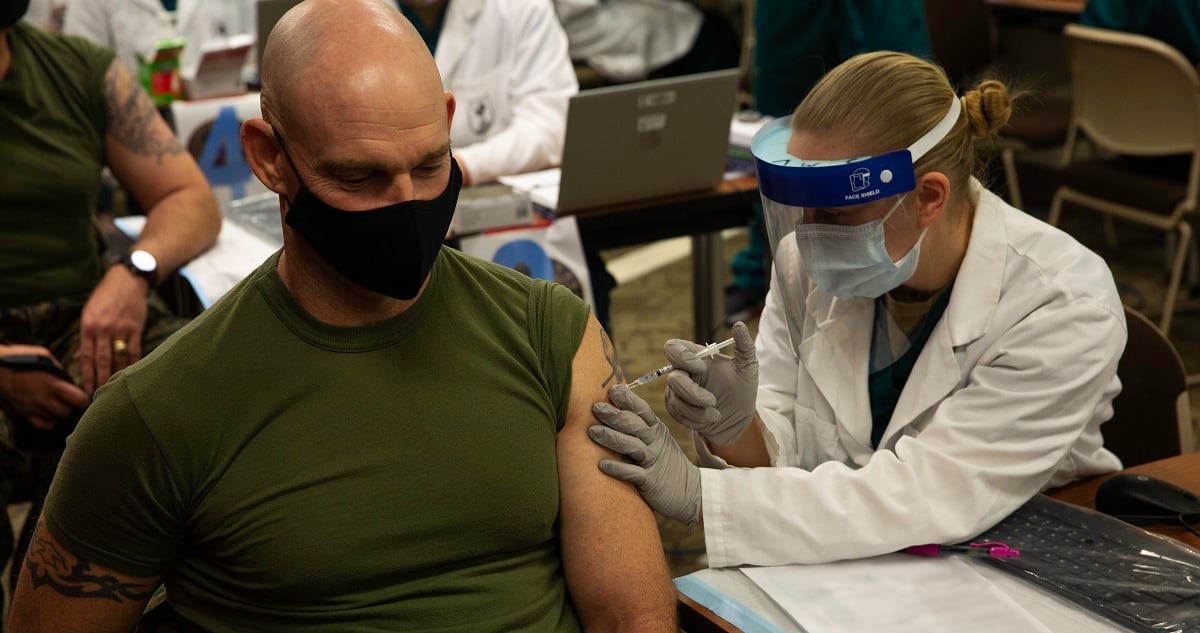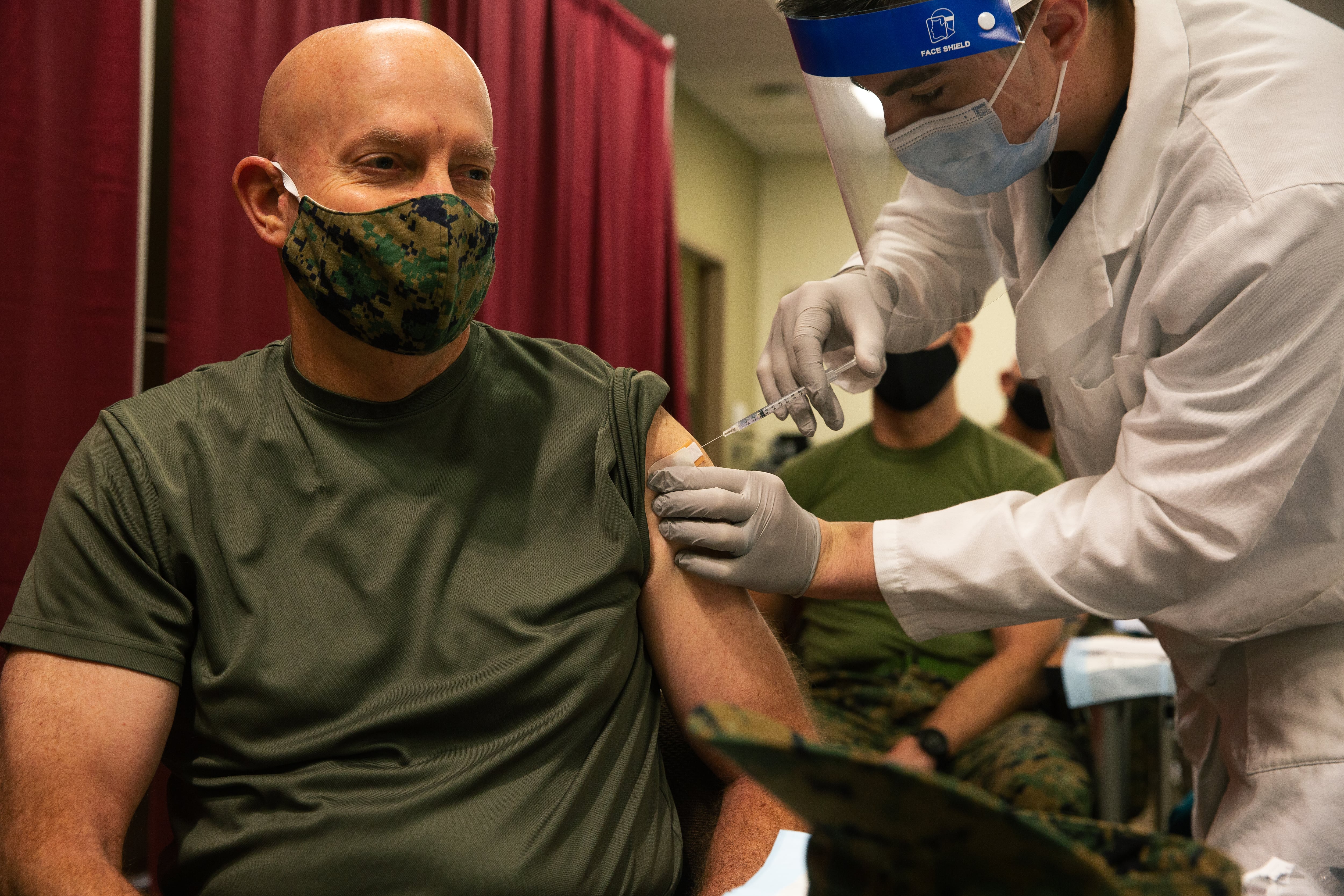Marine Corps Commandant Gen. David Berger is blaming online disinformation and conspiracy theories as the reason some Marines have refused to receive the COVID-19 vaccine.
“You have to ask each individual Marines their reason why,” Berger said on Thursday at an event at the Aspen Security Forum.
“But I think we’re challenged by disinformation … that still swirls around about where the genesis, how did this vaccine get approved, is it safe is it ethical ― all that swirls around on the internet and they see all that they read all that,” Berger said.
RELATED

Vaccine requirements are not new, the commandant said. His opinion is that that refusal to get a vaccine goes against the Marine Corps mission.
“We have to be ready to go, everyday all the time,” Berger said. “We are the ready force we have to be ready to go.”
“Just to get through boot camp you got to get 12 vaccinations,” he said.
But hesitancy among some troops remains.
Fears about the vaccine have ranged from concerns about the speed of development or unease about mRNA, which is used in the Pfizer and Moderna vaccines, to conspiracies that the vaccine comes with a tracking chip, will magnetize people or even make people glow in the dark.
If the Corps’ vaccination rate does indeed peak at its current 93 percent, it would mean over 12,500 Marines will face separation.
On Wednesday the Air Force announced that nearly 8,500 members of the Air Force and Space Force failed to meet its vaccination deadline.
Of those, about 6,800 have either received an exemption or are waiting on a response, about 800 have simply refused the vaccine and about 2,800 have neither outright refused the vaccine nor applied for an exemption.
Despite the looming deadline, Berger does not believe the Corps will have to separate thousands of Marines for refusing the vaccine.
“I don’t think it will be thousands of Marines,” he said. “We’ll have to wait until the end of November to see,” he said.
Deadlines
Active-duty Marines have until Nov. 28 and reservists have until Dec. 28 to receive the coronavirus vaccine.
On Thursday the Corps announced that 88 percent of active-duty Marines were fully vaccinated, while 93 percent were partially or fully vaccinated.
The reserve numbers are significantly lower, with only 56 percent of Marine reservists reported to be fully vaccinated while 69 percent are fully or partially vaccinated, the Marine Corps said.
Berger said the reserve numbers may be an undercount because the Corps has less oversight over those Marines and does not receive immediate updates on when they are vaccinated.
“They may have gotten the vaccine last week and we wouldn’t know it,” Berger said.
But the numbers are still worrisome to Berger.
“We are concerned though, about the disparity, the difference between active duty and reserves, that’s got to close,” Berger said.
On the active duty side, those who wish to follow the order are running out of options to get vaccinated.
The deadline to receive the first dose of the Pfizer vaccine passed on Oct. 24, while Marines opting for the Moderna vaccine had to have received their first dose by Oct. 17.
For Marines who have not had any doses of any vaccines yet, the only remaining option to follow the order is to receive single dose Johnson & Johnson vaccine by Nov. 14.
For active duty Marines, the fully or partially vaccinated rate has not increased from 93 percent since Oct. 28 when the Marine Corps last released updated vaccination rates.
All Marines may apply for a medical, religious or temporary administrative exemption to the vaccine.
As of Oct. 20, no religious exemptions had been granted to Marines for the COVID-19 vaccine, Capt. Andrew Wood, a Marine Corps spokesman said.
“There is no record of any religious accommodations for vaccination being granted by HQMC in the past 10 years,” he added.
Berger said the Corps was quickly processing all exemption requests it has seen.
“Within a week they’ll get an answer back,” Berger said about exemption requests on Thursday. “Very few have been granted.”
On Friday Wood said the Marine Corps will not release any more information about exemption requests or accepted exemptions until after the Nov. 28 deadline is passed, “Given the proximity to the deadline and a fluid environment.”
The Corps has been very clear about what happens to those Marines once the deadline passes: They will be administratively separated. Marines who receive other than honorable discharges due to vaccine refusal face will potentially lose veterans benefits.
“It’s black and white … we need to protect ourselves,” Berger said.
RELATED

Adverse effects
While some claims, like magnetization and tracking chips can be more easily dismissed as scientific impossibilities, the fear of adverse effects remains.
Between Dec. 14, 2020, and Nov. 1, 9,367 deaths were reported in the vaccine adverse event reporting system, or VAERS, out of the nearly 200 million Americans who were vaccinated against COVID-19, according to the Center for Disease Control and Prevention.
The vaccine reporting system allows anyone to report adverse effects after taking a vaccine and is a tool used by doctors to identify trends of adverse side vaccine side effects.
No studies have tied any deaths directly to the COVID-19 vaccine.
A study by the CDC into mortality rates for those who received the vaccine between December 2020 and July 2021 found that the vaccinated had a lower non-COVID-19 mortality rate than a similar unvaccinated population.
“This finding reinforces the safety profile of currently approved COVID-19 vaccines in the United States,” the study said.
The vaccines do come with some side effects, most common is a sore arm around the injection site and short-term flu-like symptoms, which generally end within a day or two.
The two mRNA vaccines come with a warning from the Food and Drug Administration after inflammation of the heart muscle, known as myocarditis and inflammation of the tissue surrounding the heart, known as pericarditis, were reported 12.6 times per million 2nd dose of the vaccination, or in 0.00126 percent of injections in the United States.
Some people are less worried about the potential side effects from the vaccine but simply do not believe it is effective in stopping the contracting or spread of the virus that has so far killed 73 service members and a total of 587 military, civilian contractor or dependents within the Department of Defense.
The exact effectiveness varies between each vaccine studies are still being conducted on the long-term effectiveness of vaccination.
A study by the CDC published in September showed that the Moderna vaccine was 93 percent effective against hospitalization, the Pfizer vaccine was 88 percent effective against hospitalization and the more tradition Johnson and Johnson vaccine was 71 percent effective against hospitalizations.
Comparatively the smallpox vaccine, routinely given to Marines before a deployment to Central Command, has an effectiveness rate of 95 percent for three to five years before decreasing, according to the CDC.




